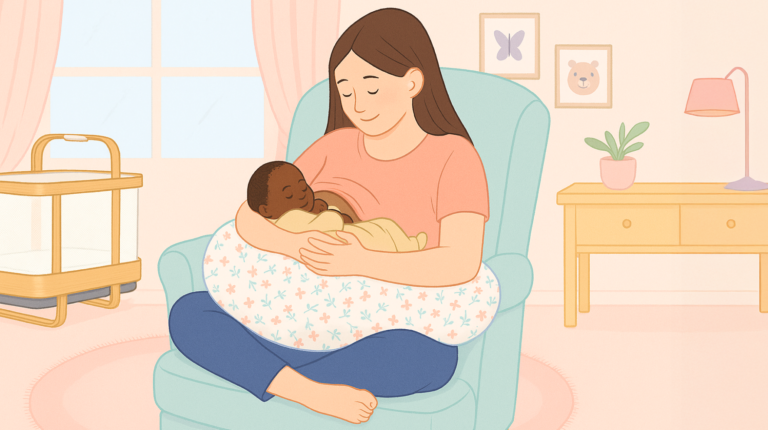Getting a good night’s sleep with a newborn can feel like an impossible feat. Getting a good night’s sleep when you have a toddler and newborn? Someone should start handing out medals.
But if stress over sleep as a family of four (or more!) is keeping you up at night, we can help! Here are seven tips to support your older child when you have a new baby who’s up all night.
1. Prepare your older child in advance for what to expect
Long before your family’s newest tiniest member makes an appearance, start prepping your older child for the changes that are about to take place. This can involve reading books about new babies, spending time with friends who have babies, or simply having conversations about how a baby’s sleep is very different. Be sure to explain that babies cry often to communicate something — and that crying can mean that a baby is learning something new, not necessarily that anything is wrong.
2. Involve your older child in preparing for baby’s sleep
Discuss sleep as a family goal, and make sure your older child feels a part of the preparation. This can include picking out sheets for the baby’s crib, selecting white noise sounds (let them scroll through your Cradlewise app to find the right curated music or sounds for baby!), or helping to “make sure” the light-blocking curtains are in exactly the right place. Being a big sibling is a very important job, after all!
3. Lay out clear rules for when baby is sleeping
While it might seem like your older child is deliberately getting noisier during nap time or demanding more attention at bedtime (and, honestly, they might be), sometimes the simple answer is that they’re not sure what’s expected of them. At a neutral (low-stress) time, outline some clear rules for how everyone is expected to behave when the baby is sleeping. These could include certain rooms or parts of the house being off-limits, certain toys or games being saved for times when everyone is awake, or simply not yelling or playing loud music when the baby is asleep.
4. Maintain your older child’s bedtime routine — without baby
As much as possible, try to maintain the same bedtime routine your older child is used to. And, as much as possible, try to do it without their younger sibling involved. Not only can this help provide your older child with precious one-on-one time they will likely be craving, it can also help head off any sibling jealousy. Because babies generally go down for the night later than their older siblings, it can be hard for your older child to see the baby get to leave the room with mom or dad while they’re expected to stay in bed.
5. Remember: White noise is your friend!
While you’ve probably already been enjoying the benefits of a built-in white noise machine on your Cradlewise, adding an additional buffer for your older child can help them keep sleeping through your younger child’s wake-ups. Add a machine in your older child’s room, and you may even want to put an additional sound machine in the hallway for an extra sound cushion.
6. If you’re sleep training, start on a Friday
Or any night when you don’t have a lot of commitments the next day. Not only will this be helpful the next day when you’ll all likely be missing a little sleep, it will also help alleviate some of the stress if things don’t go as smoothly as you hoped. Instead of counting down the minutes of sleep you’ll get if the baby falls asleep now, you’ll know you can all take it easy the next day regardless. (Alternatively, consider sending your older child on a sleepover to Grandma’s or another trusted friend for the first night or two of sleep training.)
7. Stay consistent, and remember these things take time
Like all parenting transitions, remember that the whole family sleeping through the night is something that generally takes some time. The best way to help quickly establish a new routine is to keep it, well, routine. Stick to the plan, and you’ll all be getting better shut-eye in no time.
More posts you might like:



